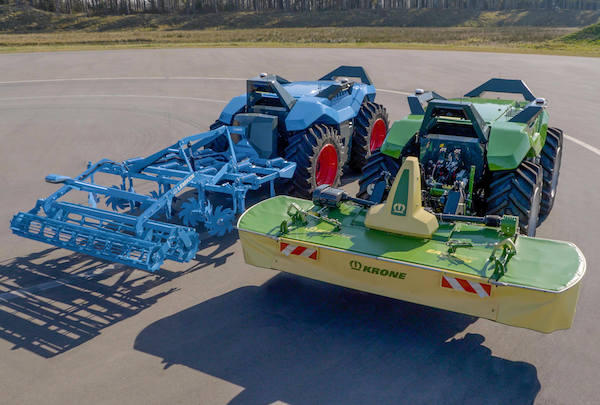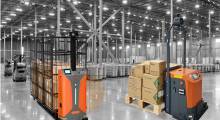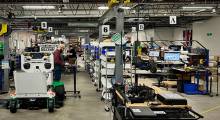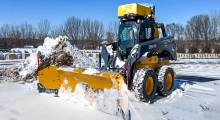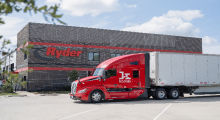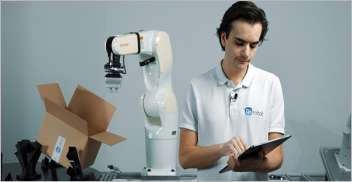As in many sectors, agriculture is suffering a shortage of skilled labor, so farmers are increasingly turning to automation. Apex.AI today announced a project with Bernard KRONE Holding SE & Co. KG and Lemken GmbH to jointly develop commercial-ready autonomous farming systems.
Their 'Combined Powers' concept vehicle can autonomously plow, cultivate, sow, mow, turn, and swath. The companies said they are transitioning the carrier vehicle from prototype to series production with Apex.AI's software development kit (SDK), which consists of Apex.Grace and Apex.Ida.
During the prototype stage, the functional models did not use any middleware, said Michael Nienhaus, a developer at Lemken. “Now that the machine is moving to production intent, there is a need for a production-grade middleware that allows splitting the software in smaller, single-responsibility functions/nodes,” he told Robotics 24/7.
“The three companies are collaborating in a joint project, in which Krone and Lemken provide the applications and define the requirements and write the application software,” said Jan Becker, CEO of Apex.AI. “ApexAI provides Apex.Grace and Apex.Ida to form the middleware in between the hardware and the application software.”
Apex.AI SDK compatible with ROS plus safety-certified
Palo Alto, Calif.-based Apex.AI said it has applied its experience in robotics and artificial intelligence to develop operating systems for autonomous vehicles. The company claimed that its SDK enables customers to accelerate software development for specific mobility applications.
Apex.AI noted that its products are based on open-source software such as the Robot Operating System (ROS) or Eclipse iceoryx. It then adds proprietary support for commercial and safety-critical applications such as real-time determinism.
Key functions of the Combined Powers architecture are based on ROS, making it a good fit for Apex.AI's products, noted the company. Unlike ROS, Apex.AI said its products are certified by TÜV Nord for applications with special functional safety requirements and are therefore suitable for commercial vehicle use.
“ROS is the de facto development standard for creating prototypes in a range of vehicle industries, but the open-source software isn’t sophisticated enough for production vehicles,” said Becker. “Our automotive-grade, real-time, reliable SDK is certified to the stringent ISO 26262 ASIL D safety standard, the highest level of auto safety that targets less than 10 failures in 1 billion hours of operation for hardware components.”
“Combined Powers follows an approach to designing an automated field vehicle [that] can be customized to specific tasks and applications,” said Manuel Volk, a developer at Krone. “The exact safety requirements are determined by the hazard and risk analysis for all implement combinations.”
“The high-level architecture of the system is designed such that there is a separation between safety-relevant and non-safety-relevant components,” he told Robotics 24/7. “The relevant standard for agricultural machines is the ISO 25119, which defines different Agricultural Performance Levels [AgPL].”
The automotive safety integrity level (ASIL) classifications in ISO 26262 are similar to the AgPL classifications in ISO 25119, said Apex.AI. The company has offices in Berlin, Munich, and Stuttgart in Germany; Gothenburg in Sweden; Tokyo in Japan; and Pangyo in South Korea.
Combined Powers to save developers, farmers time
Apex.AI, Krone, and Lemken said their Combined Powers vehicle has already proven its performance in agriculture.
“The integration during the transition from ROS to Apex.Grace and Apex.AI was very efficient, as Apex.Grace is compatible to ROS,” Becker told Robotics 24/7. “Overall, the unit offers a sustained solution to the increasing lack of skilled labor in agriculture. It frees farmers from working those long days in the field and makes them systems operators who monitor the autonomous process unit as it delivers a consistent and accurate quality of work.”
“Several hundred person-years went into the development and certification of Apex.Grace and Apex.Ida; hence adopting a stable and already safety-certified framework and middleware saves several years of in-house development,” he explained. “Based on our experience, we estimate that the adoption of Apex.Grace and Apex.Ida saves between one and five years of time to market.”
“I also expect a faster learning curve in the company, since many developers are familiar with the concepts and tools of the Apex.AI SDK from their previous work with ROS and ROS 2,” added Krone's Volk.
Spelle, Germany-based Krone manufactures agricultural machinery and precision farming technology. The family-owned business' flagship products include the BiG M self-propelled high-performance mower conditioner and BiG X forage harvester.
In addition, Krone said its product portfolio ranges from semi-trailers and refrigerated trailers to container chassis and the Rytle e-cargo bike. The company's machines are currently operating in more than 60 countries.
“Apex.AI enables us to develop applications that are largely independent of the hardware used,” said Lemken's Nienhaus. “This accelerates the development process and reduces complexity.”
Alpen, Germany-based Lemken said it has met farmers' demand for quality and innovation for 240 years. The company manufactures machines for tillage, sowing, and sustainable plant care.
About the Author
Follow Robotics 24/7 on Linkedin
Article topics
Email Sign Up

